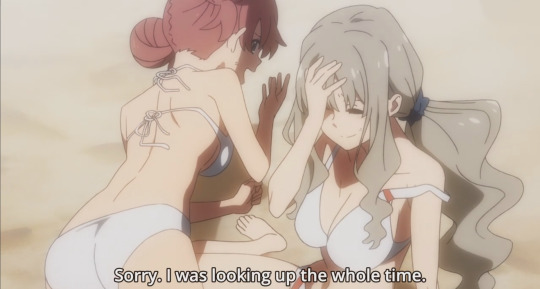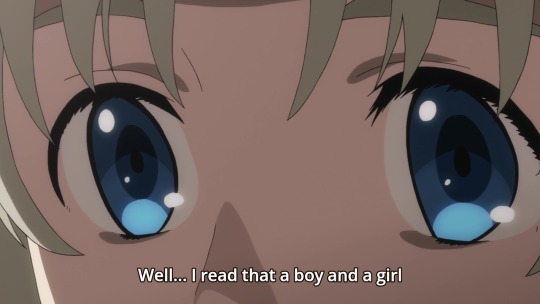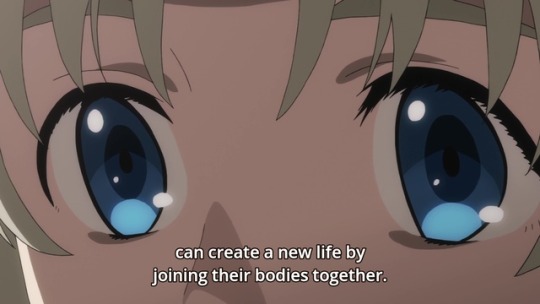This is a "Blog" for "Discussing" "Japanese Animation"
Last active 60 minutes ago
Don't wanna be here? Send us removal request.
Text
A brief defense of the most genius duo in anime history
In anime, being known for consistent quality is something of a rarity. Amongst bland seasonal adaptations of the same tired ass manga, most of us lay our hopes in those few legendary creators that have yet to let us down. Currently, my hope lies in the next Hiroyuki Imaishi/Kazuki Nakashima project, Promare. I've seen a lot of people very excited for this, because these two as Director/Writer respectively, has yet to produce anything not largely heralded as some of the most genius pieces of media to have ever been produced. But within this wide acceptance of expertise, exists a narrowly held, yet strange caveat: Kill la Kill wasn't good.
There are quite a few common and strange complaints leveled against Kill la Kill, from the animation being low quality, to being outright misogynist. The latter has always struck me as a strange conclusion to draw from the show. It’s a reasonable conclusion to draw if you’ve never watched the show, and only know that it’s an anime and the women don’t wear many clothes. These two things are generally a recipe for an objectifying male fantasy. However, the show is not an objectifying male fantasy, and that is the failing of the entire concept. The idea that Kill la Kill is misogynist is born from a misunderstanding of what makes women in anime poorly depicted: The secret to moe waifus that fill the porn folders of degenerates all over the world is not being scantily clad, but rather reductionist moe fetishing. I'm going to use Eromanga Sensei as an example for your standard fetish filling object show, marking the first time it's ever been involved in something good. Sagiri is, by all marks, not a human being: she is a loli fucktoy, and the show makes no question of this as they introduce her interests: porn, and trying to fuck some self-insert degenerate bastard. That's literally all she does. She exists for no other reason than to fulfill a fantasy. She has no aspirations beyond serving a man. This character is then dropped into numerous situations where she’s attempting to court her brother by flashing her panties and being generally perverted for the enjoyment of the viewer. Conversely, in Kill la Kill, our heroine, Ryuko is a high school delinquent-type character who seeks revenge for her father's murder, and, over the course of the show, is forced to reconcile with the world her father left for her and what her role in life really is as she fights through to see her father avenged. She spends the whole show growing, fighting, and eventually reasoning that the woman's role is not to be decided by the culture, but by the individual. In these senses, Ryuko very much escapes the trappings that reduce her to a fetish object.
It would be disingenuous of me to not cover the elephant in the room that is “Okay, but why the hell do they still dress like that?” It’s a pretty fair question, honestly. It’s no secret that in our society, a woman showing a lot of skin is regarded as an erotic object, serving the male fantasy to ogle them. Kill la Kill, however, dresses the women like this to outright challenge the concept that a scantily dressed woman is scandalous and erotic in a genius scene early on in the series, where Satsuki hounds Ryuko for being embarrassed to show so much skin because she naively believes it to be a sexual exposure. The show posits the concept that there's nothing inherently sexual about the naked body, or a partially revealed woman, to be more specific. Kill la Kill then goes on to establish throughout the show that clothing is a vehicle of subjugation, in the most literal possible sense. In the metaphorical sense, however, it expresses that clothing in the real world is a vehicle men have used to subjugate women: It hides the body to offer males exclusivity to the nude body, causing the female form to become coveted and sexual. Kill la Kill in general has a tendency to use clothes as allegories for the ideals imposed on women that exist to bind, like when Ryuko has a wedding dress forcefully has a wedding dress sewn onto her body, obviously parroting the pressure on women to marry and live a subservient life of child-bearing and house upkeep.
In the end, the interpretation of Kill la Kill as a genuine exultation for sex positive feminism or a misogynist nightmare lies in how you read the show, and I’ve always felt that reading it in a way that suggests misogyny requires some level of inability to read subtext, or flat out personal incredulity. I’ve never seen my thoughts more concisely presented on the matter than the reply by YouTuber and good media liker Harris Bomberguy to a curiouscat anon who decried Kill la Kill as a demeaning show to women, so I suppose I will leave you all with an excerpt.
“Not to be rude, but I think your version of reading places the expectation to be narratively coddled, TOLD who is the bad guy, over your own duty to decide the meaning of the text. You want Kill La Kill to point at you personally and explain why narrativisation of feminist empowerment stories still contains exploitative and reductive generalisations that affect not just your perception of real women, but women's expectations of themselves, in straight-laced terms, and thereby shirk the burden of actually interpreting a story in which a woman is sewn into a wedding dress and it controls her mind. “
3 notes
·
View notes
Text
Good Ass Anime Scenes: Hatoko Kushikawa Does Not Understand
The most effective barrier you can construct between two people is one that makes relation with the other impossible. It's a completely alienating, impenetrable wall that shuts out any and all meaningful communication. Whether by design or by pure happenstance, these subcultural barriers build themselves like an ever-growing rubber band ball -- A shorthand term here, a nickname there, and soon you're creating an esoteric bubble only you and a handful of others can parse meaningfully.
This is the baseline of the above scene from When Supernatural Battles Became Commonplace, A show about a Chuunibyou and his harem friends suddenly gaining magic powers that they then invariably fight evil with. Normally, it isn't a show that would catch my interest, and on the whole, it isn't. This scene in particular, though, is interesting to me on a couple levels. It touches on the frustrations of dealing with being wholly alienated by the esoterics of subculture, on not only a sense of being unable to understand the lingo, but also on a completely fundamental inability to grasp what makes the pillars of the culture appealing on any level.
Hatoko has found herself in a situation where something completely new came into her life, beyond her choice or want, and is forced into the world of those who want/have magic powers, bereft of context or desire. She's never seen value in chuuni concepts, and despite her attempts to find value herself, her perspective cannot find any such value. To her, the barrier into this subculture is entirely insurmountable.
Some seek belonging in places they've no real stake in, for the sole purpose of being able to belong. Jurai is a Chuunibyou who really only wants the perceived clout of being able to cast spells and shit. He isn't interested in much else, rolling with the rule of cool and giving the finger to any concept he doesn't give a shit about. The entire Chuunibyou archetype is built around the fantastical posing of seeming powerful and intelligent, but without having to commit effort to being either of those things.
When subculture hits a certain point of abstraction, it demands specific behavior from those who identify with it, resulting in singularity. The consequence, of course, is loss of individual expression -- Identifying yourself subculturally is suicide individually. For example, Identifying yourself as a"Gamer" or a "Chuuni" or an "Otaku" sets specific limitation and expectation of your every action and value. You cease to be individually judged, and become judged instead using your subculture's values as the point of reference, forcing those who identify subculturally to conform with the core philosophy or be excommunicated.
Essentially, Hatoko cannot fathom an existence where she is a carbon copy of a bunch of other dudes, all forced to communicate and live underneath restricting expectations of their behavior, that ultimately renders meaningful dialogue completely impossible. She can't understand why anyone would give up their self just to belong.
And honestly? Nobody should understand that.
#when supernatural battles became commonplace#anime#inō-batoru wa nichijō-kei no naka de#ino batoru#good ass anime scenes
8 notes
·
View notes
Text
Darling in the FranXX midseason thoughts.
I want to preface the rest of this with a disclaimer and promise that this isn’t an April Fools joke, because for any of you who (like me) caught a few episodes of this show, only to promptly drop it because it was hot garbage that was going nowhere fast, any praise I’m about to give it will seem like a joke. So, I assure you, I’m playing this all straight. Also, spoilers up to episode 12.
Darling in the FranXX was a show I was skeptical of from the day of it’s announcement. Trigger is my favorite anime studio of all time, but the mere presence of A1 could ruin it all very, very easily by injecting it with the same brainless pandering designed to sell merch to otakus. Once the show hit air, I began to see much more of the traditional A1 treatment, which makes sense, considering the staff. Even so, I found myself sorely disappointed, having seen so much Trigger in the concept (a dystopian world where humanity’s forced to live underground in cities that elicit the hell out of Neon Genesis Evangelion’s architectural stylings, with just a touch of Honnouji.) Though, as it turns out, the assumption that this show would forever be sex jokes in service of nothing and cool mech fights in service of nothing would be wrong. I find it interesting that they’d hide the real beginning of the show in the seventh episode--the dreaded beach episode. Initially, that was the point where I convinced myself it was over for this show, and it wasn’t interested in being good, something you’ll have to forgive me for, considering all six prior episodes almost solofocus on hammering home that the show’s all about sex. From the doggystyle mechs, to the girls changing in the locker-room, A1′s otaku-pandering hands dominate the first seven episodes, before it decides it’s had enough of that, and slowly begins to drop it’s facade, revealing the actually interesting stuff it’s had behind the curtain this whole time. As much as I hate to admit it, the effect worked. It was just subtle enough that you had to stop and make the connection that just a couple episodes ago, these kids were ogling the girls at the beach, like it was the start of a hentai. Like, seriously, this:

Is from the same show as this.

Given, tone shifts of this measure aren’t exactly atypical of anime, but for a show to start out this insepid, with mostly just fanservice and Trigger mech fights (To be fair, trigger mech fights are valid justification for watching a show.), it felt like I was watching brainless eye candy that wasn’t ever going anywhere. I brushed over this briefly, but surprisingly, the beach episode is where my perception of the show began to change, where I began to put all the puzzle pieces together and see the show for something beyond just mechs and tits. I’d been looking for a long time for the reason such obvious, constant allusion to sex would be included, hoping that it wasn’t just to please an undiscerning audience, and until that beach episode, I had no reason to believe this wasn’t the case. The beach parts of that episode in and of itself is nothing special, but towards the end, the characters find an old ruin--a run down Japanese town, and go into a building that resembled the kid’s shared housing, a ruined wood building that turned out to have been a nursery in the old world. One of the characters picks up a book on childbirth, and I begin to realize that it’s not all about sex, but about procreation. The presence of modern day Japan and the childbirth book felt a neon sign that assures anyone still doubtful that there’s a message here. Even with that idea in my head, it still took me a few more episodes to understand what exactly that message was, considering the show seriously has no clue what it wants to be. However, I do think it’s got a point to make about Japan’s birth rates.
Before I delve more into why, an understanding of why Japan’s birthrate is declining is requisite. There’s many theories, and certainly just as many factors, but the most commonly accepted theory is that the expectation of males to be the main moneymakers in the household, combined with the fact that most jobs in Japan can only provide enough money to support one person, making it not viable for a man to have one job that can cover for the cost of 2 or more extra people. Add the fact that women are typically discouraged from working, especially so if they’re married with children, and women with jobs are subject to serious inequal pay and treatment in almost all cases, and you have a serious problem. Now, Darling in the FranXX is a show that is very clearly about sex and procreation, and establishes a very clear dichotomy between the emotional, pubescent teenagers, and the faceless adults who are banned from enjoying life, who live the dystopian life the kids fight to protect. The dichotomy between males and females is also established, if less apparent, with the males having a big X on their uniform, and the females having a big Y on theirs, in addition to eating at separate dinner tables, and the like. The division between the male and female is established, much like it is in most societies. However, there’s one character who doesn’t seem to fit in to any of these dichotomies, and that’s the big posterchild of the whole show: Code 02, or Iota, as she’s later called. The show establishes she’s nonhuman, and she refuses completely to fit into any of these dichotomies. She has the knowledge an adult would possess, yet she’s considered a kid. She’s a female parasite, yet she doesn’t wear the standard ‘Y’ Uniform. She’s a member of Ichigo’s team, yet she’s never really around their gatherings. She’s rebellious, disinterested in the norm, and really only interested in “becoming human.” She’s a pretty obvious catalyst of change, and she has the power to save the show.
I didn’t really want to focus too much on the bad aspects of this show, that wasn’t really the point of this post. I wanted to focus on the ways this show surprised me, but I don’t feel it fair to not mention it’s failings, because there are quite a few.
First and foremost, it is very confusing to watch, because all it really does is open plot threads it forgets about instantly and leaves you to wonder if it’ll ever get closed. It gives the feeling that it doesn’t know what it wants to be, which, isn’t really something I can argue with, it absolutely struggles with the point often, but I really can’t tell if it doesn’t know what it ultimately wants to be until the show’s run it’s course.
Second, are it’s extremely conflicting messages on sexuality. Piloting a FranXX is a metaphor for not a direct metaphor for sex, rather procreation (by piloting a FranXX, you defeat monsters, thus allowing humanity to continue existing, in much the same way as having a child allows humanity to continue existing.) While the show takes time to establish that two parasites of the same sex can’t pilot a FranXX together, it for some reason, leaves the possibility that it’s actually possible to do. It’s confusing and entirely undecipherable, and until the show ends or expands on this point, It’s likely that it will remain this way.
I don’t really want to recommend a show solely based on it’s potential to be good, and while it has it’s moments, I still think it’s a show you should hold off on until it gets a proper conclusion, because as it is now...it’s a lot of weird, and a lot of confusing.
31 notes
·
View notes
Text
I'm busy being lazy
So, in lieu of any review or anything, I'll link my anime list, with little blurbs I've written about some of my favorite shows.
https://anilist.co/user/wade5454/animelist
First actual post "soon"
0 notes


